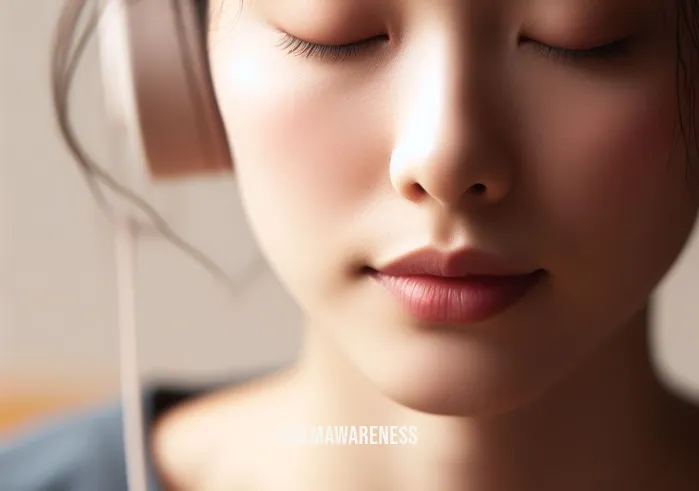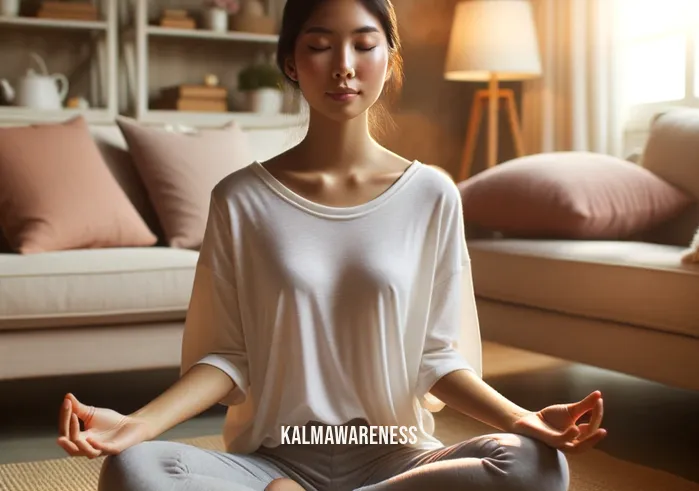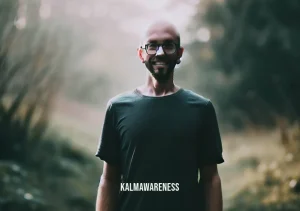An Introduction to Mindful Yoga Therapy: The Holistic Approach to Mental Health and Well-being
In today’s fast-paced world, our mental health often takes a backseat. We find ourselves constantly racing against time, lost in the whirlwind of daily chores, tasks, and deadlines. But amidst this chaos, there lies an oasis of calm and tranquility, waiting to be explored. This oasis is mindful yoga therapy.
What is Mindful Yoga Therapy?
Mindful yoga therapy is a holistic approach that combines traditional yoga practices with mindfulness techniques. It goes beyond just the physical aspects of yoga and delves deeper into its therapeutic and mental health benefits. Rooted in ancient practices, mindful yoga therapy aids in bringing about a balance between our body, mind, and soul. It aims to bridge the gap between our external surroundings and our inner self.
One might wonder how yoga, an age-old practice mainly associated with physical well-being, intertwines with mindfulness, a mental discipline that emphasizes staying in the present moment. The synthesis of these two creates a powerful tool for healing and self-awareness. Let’s explore this union further.
The Power of Being in the Present
“Life is available only in the present moment“. This profound statement echoes the core philosophy of mindfulness. Often, our mind is either ruminating over the past or anxious about the future. Rarely are we truly present in the ‘here and now’. But when we embrace the present, we open ourselves to experience life in its fullest form.
Practices like micromeditating and meditation in motion teach us to focus our attention on the current moment. They guide us to be aware of our surroundings, our feelings, and our thoughts without any judgment.
Yoga and Mindfulness: A Match Made in Heaven
Incorporating mindfulness into yoga takes the practice to another dimension. While yoga, by itself, offers numerous health benefits like increased flexibility, strength, and stress reduction, adding a layer of mindfulness enhances its healing potential. It becomes more than just a series of postures or asanas. It transforms into a meditative experience, connecting the body and mind.
For instance, mindful muscle engagement during yoga poses enables practitioners to be acutely aware of each movement. It accentuates the importance of the journey rather than the destination. By paying attention to every breath, every stretch, and every pause, one can experience the true essence of yoga.
Moreover, specific forms of yoga, like gratitude yoga, already have mindfulness woven into their fabric. They are not just about practicing poses but also about cultivating a sense of gratitude, love, and kindness.
Mindful Yoga Therapy in Everyday Life
Incorporating mindful yoga therapy into our daily routine can bring about transformative changes. It equips us to handle stress better, improves our focus, and enriches our overall quality of life. By being more in tune with our bodies, we also cultivate a deeper understanding of our mental and emotional states.
For those new to this practice, resources like mindfulness books for teens can provide a gentle introduction. Regardless of age, it’s never too late to embark on this enriching journey.
Looking Ahead
In the subsequent segments, we’ll delve deeper into the nuances of mindful yoga therapy. From exploring ancient African meditation techniques to understanding the therapeutic effects of mindful hiking, we’ll embark on a comprehensive journey. We’ll also shed light on how organizations are recognizing the importance of these practices, with platforms like a renewed mind employee portal offering mindfulness-based interventions.
If you’ve ever wondered how holistic healing can pave the way for a more balanced and harmonious life, continue reading in the next segment. Together, we’ll unravel the transformative power of mindful yoga therapy.

Harnessing the Transformative Power of Mindful Yoga Therapy
As we venture deeper into the realm of mindful yoga therapy, it’s essential to understand the facets that make this approach stand out. While Chapter 1 offered a glimpse into the therapeutic world of mindfulness merged with yoga, in this chapter, we’ll illuminate how it acts as a potent tool for healing, self-awareness, and mental well-being.
The Multifaceted Benefits of Mindful Yoga Therapy
Mindful yoga therapy transcends beyond merely combining yoga and mindfulness. It is a systematic approach that taps into various aspects of mental and emotional well-being.
- Physical Healing: Yoga poses or ‘asanas’ aid in releasing physical tension, enhancing flexibility, and building strength.
- Emotional Balance: Through mindful skills, one learns to manage emotional upheavals and develop resilience.
- Mental Clarity: Techniques derived from meditation pleine conscience help in decluttering the mind.
- Spiritual Growth: Mindful martial arts and similar disciplines accentuate the spiritual side of the therapy.
- Holistic Well-being: By intertwining the physical, emotional, mental, and spiritual aspects, mindful yoga therapy offers a comprehensive approach to health.
These benefits underline the transformative nature of mindful yoga therapy, which echoes its importance in modern therapeutic practices.
A Snapshot: Mindful Yoga Therapy Techniques and Their Impact
To understand the depth of mindful yoga therapy, let’s delve into some of its key techniques and their potential impact:
| Technique | Core Principle | Benefits |
|---|---|---|
| Breath Awareness | Focusing on the breath’s rhythm and depth | Calms the mind; Enhances concentration |
| Mindful en Español | Bilingual approach to mindfulness | Encourages inclusivity; Wider reach |
| Guided Imagery | Using visualizations for relaxation | Reduces anxiety; Fosters positivity |
| Yoga Nidra | Deep relaxation while maintaining consciousness | Relieves stress; Promotes deep sleep |
| Mindful Miracle | Embracing the wonder in everyday moments | Boosts gratitude; Increases happiness |
This table offers a concise overview, but it’s important to note that the benefits of these techniques can vary from person to person, based on their unique experiences and needs.
Overcoming the Challenges of Habitual Thinking
One of the primary challenges in our journey towards mental health and well-being is the cycle of habitual thinking. We often find ourselves trapped in patterns of negative or repetitive thoughts. But what exactly is habitual thinking?
Simply put, it’s the brain’s way of taking a shortcut. Instead of processing new information, the brain relies on previously formed patterns. While this can be efficient in some situations, it might also lead to stagnation, especially when these patterns are negative.
Mindful yoga therapy equips us with tools to break free from this cycle. Through practices like meditation, breath awareness, and mindful asanas, we learn to recognize these patterns and gently steer our mind towards a more positive and constructive path.
Delving into Stories: Meditation Narratives for a Younger Audience
While mindful yoga therapy can be a boon for adults, it’s equally, if not more, beneficial for the younger generation. With the challenges they face in today’s digital age, tools for mental well-being become indispensable. Meditation stories for students offer a relatable and engaging way for them to embrace mindfulness. These narratives, rooted in real-life experiences, make the concepts of meditation and mindfulness more accessible and intriguing.
A Peek into the Next Segment
As we’ve journeyed through the myriad techniques and the transformative power of mindful yoga therapy, it’s evident that this approach is not just another wellness trend. It’s a holistic pathway to mental, emotional, and physical well-being.
In the next segment, we’ll explore the science behind these techniques. How does mindful yoga therapy affect our brain? What physiological changes take place when we embrace this approach? Continue reading to discover the intriguing blend of ancient wisdom and modern science.

Illuminating Pathways: Hope through Mindful Yoga Therapy
There is a profound connection between mindful yoga therapy and the inspiration that drives countless individuals to rediscover their mental, emotional, and physical equilibrium. In a world that often feels tumultuous, it is stories of hope, the wisdom of age-old teachings, and personal breakthroughs that offer solace.
Breathing Life into Wisdom: Timeless Quotes
Quotes have the unparalleled power to succinctly express vast oceans of feelings, providing solace and inspiration. Here are some that deeply resonate with the ethos of mindful yoga therapy:
“In the midst of winter, I found there was, within me, an invincible summer.” – Albert Camus. Just as yoga unearths our inner strength, this quote reminds us that we have an undying spirit within, waiting to shine.
“The body benefits from movement, and the mind benefits from stillness.” – Sakyong Mipham. A testament to the dual role of yoga: invigorating the physical form and calming the wandering mind.
“Mindfulness isn’t difficult; we just need to remember to do it.” – Sharon Salzberg. This quote aligns seamlessly with the teachings of meditation in motion, where everyday activities become acts of meditation.
The Beacon of Hope: Real-life Inspirations
Samantha’s Journey: Battling anxiety disorders for most of her adolescent years, Samantha felt trapped in an endless cycle of fear and apprehension. Introduced to mindful yoga therapy through a meditation consultant, she began her transformative journey. Within months, the synthesis of breathwork, poses, and mindfulness exercises started peeling away layers of accumulated stress. Today, Samantha is not only an advocate for mindful yoga therapy but is also pursuing a career as a mindfulness coach.
Liam’s Revelation: After a debilitating accident that left him paralyzed waist down, Liam struggled with bouts of depression. While physical therapy helped rebuild strength, it was the practices he learned from mindful hiking—a blend of nature, movement, and mindfulness—that rekindled his spirit. Liam’s story showcases that the mental battles we fight can be as challenging as the physical ones, and tools like mindful yoga therapy can be instrumental in these battles.
Priya’s Awakening: Balancing a high-powered corporate job with the demands of a young family, Priya often felt overwhelmed. During a retreat in Gratitude Yoga, Princeton, she experienced the interplay of mindfulness and yoga. Priya’s days now begin with a session of mindful yoga, ensuring she remains grounded amidst chaos. Her story underlines the fact that mindful yoga therapy isn’t just for those facing evident challenges; it’s a balm for the subtle, everyday stresses that accumulate over time.
“Life is available only in the present moment.”
Drawing inspiration from this profound statement, we can appreciate how mindful yoga therapy acts as a bridge, connecting us to the present. Our daily lives are rife with distractions—past regrets, future anxieties, and the ceaseless noise of the digital age. Yet, through the practices of yoga and mindfulness, we anchor ourselves to the ‘now,’ discovering peace and clarity.
Preparing for the Journey Ahead
As we derive inspiration from quotes, real-life stories, and timeless wisdom, it’s essential to understand that every individual’s journey with mindful yoga therapy will be unique. What remains constant is the foundation of hope, resilience, and transformation that it promises.
In our next chapter, we delve into the roots of mindful yoga therapy, tracing back to ancient traditions and practices. Discover how time-honored rituals from diverse cultures have converged to create this holistic therapeutic approach. Continue reading to journey through time, understanding the age-old secrets behind today’s practices.

Unraveling the Threads: The Facets of Mindful Yoga Therapy
Mindful yoga therapy has been making waves as a potent blend of traditional yoga practices and modern therapeutic techniques. But what are the intricate details, the cogs, and wheels that make this approach so effective? Let’s delve deeper, examining the core elements that constitute this therapeutic discipline.
Components of Mindful Yoga Therapy
Breathwork (Pranayama): Breath, the life force, plays a pivotal role. Through controlled breathing techniques, individuals can regulate their emotional responses, cultivate mindfulness, and facilitate relaxation.
Physical Postures (Asanas): By engaging the body in specific poses, practitioners can enhance flexibility, boost strength, and address specific physical or emotional challenges.
Mindfulness Techniques: Rooted in ancient African meditation practices, and other traditional forms, these techniques teach one to stay anchored to the present moment, observing without judgment.
Guided Visualizations: A tool to channel the mind’s power, fostering healing and tranquility.
Mantras and Sound: Vibrations, whether from chanting mantras or through music, can facilitate a deeper connection to one’s inner self, enhancing the therapy’s impact.
How It Stands Apart
Mindful yoga therapy isn’t merely traditional yoga with a new label. Several features distinguish it:
Holistic Approach: Beyond just physical well-being, it addresses mental, emotional, and spiritual facets of a person.
Adaptability: Tailored sessions, be it micromeditating for a quick mental refresh or a full-fledged session addressing deep-rooted issues.
Emphasis on the Present: Drawing from teachings like “life is available only in the present moment”, it reinforces the importance of ‘now.’
Incorporation of Multiple Disciplines: Elements from mindful martial arts to deep meditation techniques are integrated, ensuring a comprehensive approach.
Benefits: More than Just Relaxation
By engaging in mindful yoga therapy, individuals stand to gain a plethora of benefits:
Enhanced mental clarity and focus, reducing the fog caused by habitual thinking.
A surge in emotional resilience, allowing one to navigate life’s ups and downs with grace.
Improved physical stamina and flexibility.
A deepened connection with oneself, facilitating introspection and self-awareness.
Tools and techniques that are applicable in daily life, ensuring that the benefits aren’t confined to the therapy session.
Integration into Everyday Life
It’s not just about sessions with a therapist. Mindful yoga therapy offers tools and techniques that can be seamlessly integrated into one’s daily routine:
Morning Rituals: Starting the day with a short session can set a positive tone.
Mindful Breaks: Utilizing methods like micromeditating, one can take quick breaks during work or chores to recenter.
Evening Wind-down: A brief session before bed can ensure restful sleep and emotional processing.
Active Integration: Incorporating practices during activities like mindful hiking or even during mundane tasks.
As we’ve embarked on this journey to understand mindful yoga therapy’s profound impact, it’s evident that its potency arises from its multifaceted approach, deep roots, and adaptability. However, every journey must culminate, and in our concluding chapter, we’ll reflect on the broader implications of this therapy. What does it mean for the future of holistic healing, mental health, and individual empowerment? Join us in the final chapter to explore these horizons and more.

Reflecting on the Journey: The Essence of Mindful Yoga Therapy
As we approach the conclusion of our exploration into mindful yoga therapy, it’s time to pause, breathe deeply, and reflect upon the tapestry of knowledge we’ve woven together. This journey has been as transformative and enriching as the very practice we’ve delved into.
A Recap: The Multi-Dimensional Therapy
We started by understanding that mindful yoga therapy is more than just another wellness trend. Rooted in age-old traditions like ancient African meditation techniques and borrowing elements from practices like mindful martial arts, it offers a comprehensive approach to holistic healing. It’s a delicate balance of breathwork, physical postures, mindfulness techniques, guided visualizations, and so much more.
The Real-world Implications
The practicality of mindful yoga therapy is what makes it genuinely transformative. Whether it’s integrating techniques into daily routines, from the mindful muscle workouts to even the simple act of micromeditating, it’s designed for real-world application. It’s not an escape from reality but a tool to navigate it with grace, resilience, and awareness.
Moving Forward with Gratitude
Embarking on this exploration has not just been an academic endeavor but a heartening experience. We’ve unraveled layers, debunked myths, and hopefully, kindled a curiosity to explore further. A gratitude-filled yoga session in Princeton or delving deeper into meditation stories for students, the possibilities are boundless. It’s about finding what resonates with you and integrating it into your unique journey.
What’s Next?
While we’re wrapping up this series, remember, every end is a new beginning. The world of holistic healing, mental health, and personal empowerment is vast, and there’s so much more to explore. Perhaps it’s time to embrace the mindful miracle in your life or seek guidance from a seasoned meditation consultant. We urge you to explore more content within our magazine, deepening your understanding and refining your practices.
A Heartfelt Thank You
To our readers, who’ve embarked on this journey with us – thank you. Your curiosity, engagement, and thirst for knowledge inspire us to deliver more insightful content. We promise that our upcoming editions will continue to enlighten, inspire, and guide.
In conclusion, mindful yoga therapy isn’t just a practice; it’s a lifestyle, a mindset, a fresh lens to view the world. As we wrap up, let’s not see this as the end but as a stepping stone to newer discoveries. Let the essence of mindfulness permeate your days, and may you find joy, peace, and fulfillment in every breath you take.
Until our next enlightening journey together, keep exploring, keep growing, and most importantly, stay present.




